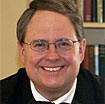Commentary on Mark 2:23—3:6
This Sunday’s pericopae conclude five that Mark carefully collocated: 2:1–12; 2:13–17; 2:18–22; 2:23–28; 3:1–6. The scarlet thread running through this series is controversy between Jesus and devoted laity. Conflict rapidly escalates.
In 2:6–8 some scribes (read: biblical scholars) refute Jesus in their hearts. In 3:5–6 some obstinate Pharisees are hatching a plot with partisans of Herod Antipas (6:14–29) to do away with Jesus. Commentators have so drilled into our heads Mark’s alleged “messianic secret” that we can miss the obvious before our eyes: here the Son of Man (2:10, 28) publicly declares his authority to forgive sins and to overrule the Sabbath (2:10–12, 28), while his adversaries secretly move from skeptical (2:6–8) to murderous intent (3:4b–6).
Two traps must be sidestepped when interpreting Mark 2:23–3:6. One is dismissing the importance of Sabbath in first-century Judaism. Nowadays some Jews and Christians faithfully observe their Sabbaths; others no longer set that day apart from the week’s other six. For many church members who aren’t hard at work 24/7, Sunday’s only difference is uninterrupted hours of golf or professional football.
In Jesus’ day the Sabbath was normative in establishing Jewish identity within Palestine and beyond. Grounded in the creation narrative (Genesis 2:1–3) and the Decalogue (Exodus 20:8–11; Deuteronomy 5:12–15), Sabbath observance is corroborated in Jewish and pagan literature throughout the New Testament era. From sundown on Friday until Saturday’s sunset, Jews encouraged one another to enjoy a day of delight (Nehemiah 8:9–12; Isaiah 58:13–14), worshiping the Lord (Isaiah 66:23; Ezekiel 46:3), laying aside ordinary work (Amos 8:5), and fighting only in self-defense (1 Maccabees 2:29–41).
“[The Sabbath’s] object is to give mortals relaxation from continuous, unending toil and by refreshing their bodies with a regularly calculated system of remissions, to send them out renewed to their old activities” (Philo, Special Laws 2.60). Jewish groups debated among themselves which activities were permissible on the Sabbath (Qumran’s Damascus Document 10:14–12:5; Luke 14:1–6; the Mishnaic tractates Šabbat [7.2] and Beitzah [5.2; circa A.D. 200]). For the ultra-scrupulous, not plucking grain on the Sabbath was a way of safeguarding that holy day from profanation—even the hint of laborious reaping—by hedging it with multiplied restrictions (Šabbat 73b in the Babylonian Talmud [late fifth century A.D.]).
The other snare we must dodge is knee-jerk censure of Pharisees, who appear in Mark for the first time in 2:24 (later: 3:6; 7:1, 3, 5; 8:11, 15; 10:2; 12:13). It’s frightening how long Pharisees have been caricatured from Christian pulpits as self-righteous hypocrites. Pharisaism was a lay reform movement within first-century Judaism, dedicated to superlative adherence to Torah in all walks of life. According to Josephus, Pharisees were celebrated by their Jewish contemporaries for “practicing the highest ideals both in their way of living and in their discourse” (Antiquities 12.15 [circa A.D. 105]). They were regarded as upstanding, devout, Bible-believing pillars of the community. To paraphrase Pogo Possum from Walt Kelly’s old comic strip, “We have met the Pharisees, and they are us.”
Two salient issues arise from Mark 2:23–3:6. As in his claim of authority to forgive sins (2:10), so also does Jesus assert extraordinary sovereignty to interpret God’s deepest intent for the Sabbath in ways that, for others, seem to undermine it. “The Sabbath was made for humankind, and not humankind for the Sabbath; so the Son of Man is lord even of the Sabbath” (2:27–28 New Revised Standard Version). “Is it lawful to do good or to do harm on the Sabbath, to save life or to kill?” (3:4a).
We God-fearing, churchgoing Pharisees could think to ourselves (as trial lawyers bellow in Perry Mason), “That question is incompetent, irrelevant, and immaterial. ‘Every case where life is in danger supersedes the Sabbath’ [Mishnah Yoma 8.6]. But the life of this fellow with a shriveled hand is not at risk. Immediate treatment is not required. His cure can wait till tomorrow.”
Angered by such hard-hearted fault-finding, Jesus forces the issue: He summons one who is crippled—who has no more asked for healing than a paralytic sought forgiveness (Mark 2:4–5)—and restores another body to wholeness. Whether the issue is hunger or healing, the satisfaction of human need (2:25) trumps reverent religiosity every time. Jesus wields a fresh teaching with authority, unlike that of the scholars (1:22, 27) and the pious. His ministry injects stress: something new into the old, fermenting wine that bursts old skins (2:21–22). Predictably, defenders of the status quo don’t like that one bit. They begin mobilizing, neither to honor nor to save this bridegroom (2:20), but to destroy him (3:6).
In Mark the bases for controversies between Jesus and his antagonists are not his mighty works as such, let alone some presumed envy for his “doing good.” Jesus submits no credentials. He simply speaks and acts, then allows his witnesses to draw their own conclusions (2:4–5, 10–12, 13–14, 27–28; 3:1–6). Jesus is a radical figure whose deeds and pronouncements strike at the root of what it means to be faithfully Jewish—and, for us this Sunday, what it really means to be Christian.
Are we any less outraged by profligate forgiveness (2:7) or fraternizing with notorious traitors, outcasts, and the flagrantly wicked, without demanding that they first clean up their acts (2:15–16)? How will we feel when Jesus runs roughshod over whatever we consider definitive of Christian conduct, even when we find it in the Bible? When the Son of Man comes wielding authority on earth (2:10a) and lordship even over the Sabbath (2:28), our lifelong assumptions cannot go unchallenged. “The good news of God” (1:14) amazes nobodies into glorifying God (2:12). It scares the piss out of society’s stalwarts, threatened by a preacher so mysterious and infuriating. “[We] proclaim Jesus, crucified and risen, our judge and our hope.”1
Notes
- A New Creed, The United Church of Canada (1968).


June 2, 2024